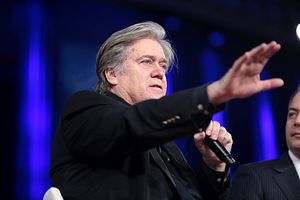In a recently published interview with the progressive magazine The American Prospect, White House Chief Strategist Steve Bannon reiterated what seasoned Korean military experts have been repeating ad-nauseam: There is no military solution to North Korea’s nuclear threats — at least not one that would not involve the death of tens if not hundreds of thousands of civilians and military personnel.
“There’s no military solution [to North Korea’s nuclear threats], forget it. Until somebody solves the part of the equation that shows me that ten million people in Seoul don’t die in the first 30 minutes from conventional weapons, I don’t know what you’re talking about, there’s no military solution here, they got us,” Bannon says.
Bannon is correct. Estimated casualties in the larger Seoul metropolitan area alone could surpass 100,000 within 48 hours. The Pentagon once assessed that a Second Korean War could produce 200,000-300,000 South Korean and U.S. military casualties within the first 90 days, in addition to hundreds of thousands of civilian deaths.
As I explained in a previous piece (See: “What Would the Second Korean War Look Like?”), North Korea has about 500 long-range artillery systems, including 170 millimeter Koksan guns, 122 millimeter launch rocket systems with extended range, as well as 240 and 300 millimeter systems, within range of the Seoul metropolitan area that could cause terrible destruction:
Assuming that around 70 percent of long-range systems are operational, and factoring in gun crew training (assumed to be mediocre at best) as well as a 15 to 25 percent detonation failure rate of KPA artillery shells, ROK /U.S. forces and civilians in Seoul would still be exposed to a deadly barrage that could kill thousands if not tens of thousands in the first hours of the conflict before KPA artillery is either taken out or has to withdraw due to the fear of being destroyed by counterbattery fire.
Unfortunately, Bannon’s second comment when mulling a possible diplomatic solution to solve the ongoing security crisis on the Korean Peninsula is less discerning. “Bannon said he might consider a deal in which China got North Korea to freeze its nuclear buildup with verifiable inspections and the United States removed its troops from the peninsula, but such a deal seemed remote,” The American Prospect paraphrases the chief White House strategist.
If cited correctly (the statement is not a direct quote), his statement is troubling for two principal reasons.
First, Bannon’s suggestion undermines U.S. defense commitment to South Korea. Withdrawing U.S. troops from the Korean Peninsula is tantamount to the United States unilaterally abandoning Seoul. Among other things, as a consequence of the U.S. withdrawal, South Korea could consider developing its own nuclear deterrent — a move likely to escalate tensions on the peninsula. South Korean President Moon Jaen-in already declared this week that South Korea cannot rely on the United States for its security. “Still, we cannot rely only on our ally for our security,” Moon said on August 15. “When it comes to matters related to the Korean Peninsula, our country has to take the initiative in resolving them.”
Second, the suggestion that North Korea merely freeze rather than rollback its program in exchange for U.S. troop withdrawal would still leave a sizeable North Korean nuclear arsenal in place including intercontinental-range ballistic missiles capable of reaching the continental United States, according to U.S. intelligence estimates. In other words, a freeze would not improve the security situation on the peninsula given that North Korea appears to be already in possession of a credible nuclear deterrent. It would also not reduce the risk posed by North Korean artillery positioned along Korea’s demilitarized zone. Last, it is also unclear why the United States would have to go through China to get Kim Jong-un to freeze his nuclear program and not directly engage in talks with the North Korean dictator.
At the end, prospects for a freeze or rollback of the program are dim. Bannon knows as much. His comments about U.S. troop withdrawal likely have more to do with his desire to revive American isolationism rather than realities on the ground in Korea.

































